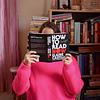Take a photo of a barcode or cover
For any fans of character studies, Shakespeare, and darker stories, I would 100000% recommend.
Graphic: Ableism, Bullying, Chronic illness, Death, Drug abuse, Drug use, Sexual content, Suicidal thoughts, Toxic relationship, Medical content, Abandonment, Injury/Injury detail
Graphic: Ableism, Chronic illness
Moderate: Suicidal thoughts, Blood
Graphic: Ableism, Chronic illness, Drug use, Medical trauma, Alcohol
Moderate: Sexual content, Blood
Minor: Suicidal thoughts
Graphic: Ableism, Suicidal thoughts, Medical content, Medical trauma, Injury/Injury detail
Moderate: Sexual content
Minor: Death of parent
Good chunks of this book were what I imagine an ecstasy trip would feel like. Miranda, our protagonist, has chronic pain that it seems everyone thinks she could simply will away if she wasn't so set on being miserable. This book is a solid commentary on how society and doctors especially don't take female pain seriously. However, the book takes a turn into magical realism territory when three strange men appear (Macbeth's witches?) to "help" her. This is where the whole "ecstasy trip" thing starts to ramp up. In addition, the ending was very open-ended and a little confusing which was probably the point but just wasn't for me personally. However, I always have to give points to a book for having theatre references.
If you enjoy reading books that are a bit outside the norm, character-driven, and have unresolved endings, you would probably enjoy this more than I did.
Graphic: Ableism, Chronic illness, Injury/Injury detail
Moderate: Suicidal thoughts, Blood
Minor: Suicidal thoughts
Graphic: Ableism, Drug abuse, Suicidal thoughts
This wouldn't be a Mona Awad book, though, without a hypnotic descent into fever dream territory. After Miranda has a magical encounter at a pub, her narration becomes more and more unreliable. What's real in Miranda's life? She herself has no idea. This segment of the book was certainly an entertaining rollercoaster ride. However, it seemed to drag on and on only to maintain ambiguity. Perhaps my lack of familiarity with Shakespeare's less popular plays is what led to my feeling of disconnect from All's Well by its ending. I could tell that Awad was referencing Shakespearean tropes and characters but many of the references flew right over my head.
Graphic: Ableism, Addiction, Chronic illness, Drug use, Suicidal thoughts, Blood, Injury/Injury detail
Apparently some people found Miranda's POV tiring, but I was engrossed. Awad does love her "can't tell if they're still experiencing reality" protagonists. I work in the medical field so the discussion about chronic pain was doubly haunting to me; I don't ever want my patients to feel unheard, to become this hopeless, although I understood the struggle of treating an "invisible" illness. Other than the Weird Brethren, there was probably a bunch of other parallels to Shakespeare's work that sadly went over my head. I already enjoyed this so much, I can only imagine how cool it must be to have that added perspective. Even the interview with the author at the end made for great reading, with the explanations about how theater/performance/pain can intertwine.
I'll leave a few of my favorite quotes here because I don't know what else to say other than I LOVED THIS, it was so freaking good.
Graphic: Ableism, Chronic illness, Mental illness, Suicidal thoughts, Medical content, Medical trauma
Moderate: Drug abuse, Drug use, Sexual content
I am literally begging authors to stop using the magically disabled and tragically disabled tropes in their books. it really shouldn't be this hard.
I also felt like Awad was trying to have an unreliable narrator but made her so unreliable that half of the story was lost. we only needed one sentence from a onlooker's pov to make the entire book make sense, but we didn't get that. instead, we got a bizarre ableist fever dream without any clear messaging. wild.
Graphic: Ableism, Body horror, Chronic illness, Drug abuse, Drug use, Mental illness, Suicidal thoughts, Blood, Medical content, Medical trauma, Injury/Injury detail
Moderate: Death, Misogyny, Sexual content
Minor: Physical abuse, Rape, Alcohol








